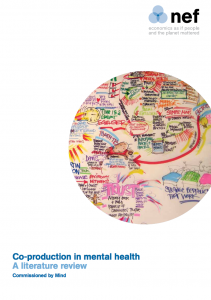
The use of care plans and Wellness Recovery Action Plans (WRAP®) (Cook et al, 2009) within mental health is commonplace.
In Wales, care planning is covered by legislation in the form of the Mental Health Measure (Welsh Government website, 2013). The care plans are designed to be developed and agreed in a collaborative way with input from the service user and their healthcare team. They often aim to identify early signs of relapse and interventions or medications which have helped in the past or are favoured by the service user.
The broader concept of co-production has gained considerable traction in the mental health world in recent times and readers interested in exploring this background topic in further detail should read the excellent literature review commissioned by Mind in 2013, which defined co-production as:
A relationship where professionals and citizens share power to plan and deliver support together, recognising that both partners have vital contributions to make in order to improve quality of life for people and communities.
Care plans are often held by service users and can be very helpful in crisis and acute settings where on-call staff may have little or no prior knowledge of the patient, but the question remains: would giving patients ownership of these records improve measurable outcomes?
A Cochrane review (Farrelly et al, 2013) published in October 2013 aimed to assess whether the use of user held records improved outcomes in patients with serious mental illness. This is an update of a previous Cochrane review published in 1999.
Methods
The authors searched the Cochrane Schizophrenia Group Trials Register (August 2011) for RCTs that compared user held clinical information beyond standard care to standard information (such as appointment cards or generic information on diagnosis and treatment) in adult patients with a severe mental illness (SMI). They defined SMI as any psychotic illness (schizophrenia or affective disorder with psychotic symptoms).
Outcomes the authors were keen to look at included:
- Psychiatric hospital admission (and compulsory admission)
- Death and violence (to self and others)
- Mental state
- Satisfaction with health care
- Compliance
- Cost
They assessed the included studies for risk of bias and used the GRADE system to summarise the findings.

Advance statements are a way for mental health service users to say how they would like to be treated in the future if they lose the ability to decide for themselves. See the Rethink website for further details
Results
After searching and identifying 75 potentially relevant studies, 4 RCTs (2 individual and 2 cluster trials) were included in the review, involving a total of 607 patients. They were all UK-based studies.
In terms of the user held information, 2 studies included “advance statements” put together collaboratively by patients and mental health care teams including information such as relapse indicators, future treatment wishes, contact details for themselves, clinicians and family/carers.
In the other 2 studies, the information held was more like a medical record including contact details, clinical notes, medications and appointments.
The review found the following results:
- The interventions had no effect on psychiatric admission rates – pooled (n = 597, 4 RCTs, RR 0.99, CI 0.71 to 1.38)
- The intervention had no effect on compulsory admission to hospital – 3 studies, pooled (n = 507, RR 0.64, CI 0.37 to 1.10)
The authors considered these findings to be moderate quality evidence:
- Psychopathology was an outcome measured in 3 of the 4 studies, but data was of little use due to skew and the large SD
- Satisfaction was measured in 3 studies but no effect found
- Violence and death were not investigated in any of the included studies
In addition, the authors identified 2 further RCTs which are still ongoing and will add to our understanding when results are available (Ruchlewska, 2009 and Thornicroft, 2010).
Conclusions
The authors concluded:
The evidence gap remains regarding user-held, personalised, accessible clinical information for people with psychotic illnesses for many of the outcomes of interest. However, based on moderate quality evidence, this review suggests that there is no effect of the intervention on hospital or outpatient appointment use for individuals with psychotic disorders. The number of studies is low, however, and further evidence is required to ascertain whether these results are mediated by the type of intervention, such as involvement of a clinical team or the type of information included.
The authors therefore acknowledge that one of the difficulties in answering this question is the heterogenous nature of these user held records.
This review highlights a lack of evidence to support user held records in this group of patients and it is clear that further large, high quality studies are needed. It will be interesting to see the results of the ongoing studies on this topic as user held records seem to be just a small step from the joint care plans already widely used.
Links
- Farrelly S, Brown GE, Flach C, Barley E, Laugharne R, Henderson C. User-held personalised information for routine care of people with severe mental illness. Cochrane Database of Systematic Reviews 2013, Issue 10. Art. No.: CD001711. DOI: 10.1002/14651858.CD001711.pub2.
- User-held personalised information for routine care of people with severe mental illness. UK Database of Uncertainties about the Effects of Treatments (DUETs), 5 Oct 2013.
- Cook, JA, Copeland ME, Hamilton MM, Jonikas JA, Razzano LA, Floyd CB, et al. Initial outcomes of a mental illness self-management program based on Wellness Recovery Action Planning (PDF). Psychiatric Services 2009;60:246-9.
- Mental Health (Wales) Measure 2010. Welsh Government website, 2013. Last accessed on 23/1/14.
- Co-production in mental health: a literature review (PDF). The New Economics Foundation, Nov 2013.
- Ruchlewska A et al. Study protocol: The effects of crisis plans for patients with psychotic and bipolar disorders: a randomised controlled trial. 2009.
- Thornicroft G et al. Study protocol: CRIMSON [CRisis plan IMpact: Subjective and Objective coercion and eNgagement]: A randomised controlled trial of joint crisis plans to reduce compulsory treatment of people with psychosis. Trials 2010, 11:102.




@Mental_Elf fascinating – thanks for sharing!
@Mental_Elf “”No evidence to support user held records” – surely efforts to empower and involve can be viewed as moral good in own right?
@r_thurston asks: Where’s the evidence for user held records in mental health? http://t.co/hMU0z70UIC
Do we need RCTs to show that user held records are helpful for patients with severe mental illness? http://t.co/hMU0z70UIC
Don’t miss: Cochrane find no evidence to support the use of user held records for patients with severe mental illness http://t.co/hMU0z70UIC
@Mental_Elf Why “Don’t miss”? This was very inconclusive. Qui bono? Those who want to say, “We needn’t collaborate with the mentally ill.”
Mental Elf: Cochrane review finds no evidence to support the use of user held records for patients with severe… http://t.co/OgYxQUSKRb
Just came accross this information.
I do not think you can compare WRAP with other forms of care/crisis plans, WRAP facilitated properly, is soley developed and owned by the person, crisis plans are often initiated and owned by the service and are a requirement of the service, this is an example of the widespread confusion regarding the concept of “recovery”.
An Irish evaluation of WRAP gave positive results.